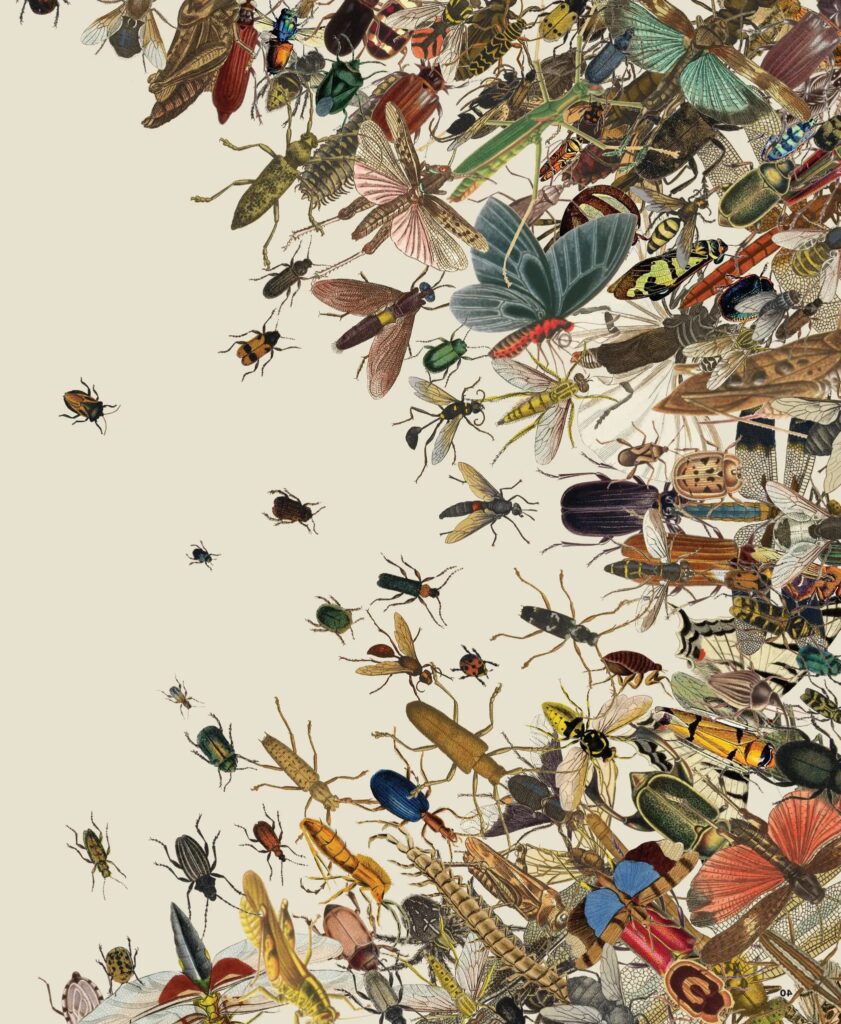If you’ve ever shared a picnic or summer evening outdoors with annoying insects, found a spider in the shower, or had your vege patch demolished by munching bugs, the news that they are declining in number may come as a relief. Unfortunately though insects play a bigger role than disrupting human activities.
Since the 1970’s, it’s estimated that insects numbers may have dropped by as much as 50% around the world. Do you remember when you were younger seeing more bugs splattered on the front of car grilles and windscreens after a drive through the bush or farmland? Or having more dragonflies and butterflies around? These are the visible signs of change but there are more that go unseen.
Insects make up a huge amount of life in the world, with over a million known species. It’s hard to guess the volume of insects, as so many go about their lives underground, in trees, and other hidden places. Scientists estimate that of the total weight of living creatures (biomass) on Earth, insects make up around 16.2%, with humans totalling 2.3%. Just think how much bigger you are than an ant!
There are many important roles that insects play in growth and nutrient cycling in the natural world. They are a crucial part of the food web, feeding fish, birds and some animals. Platypus mostly eat waterbugs. Insects pollinate flowers, forming the fruit and seeds that we eat. When plants lose their leaves or complete their life cycles, insects help to break these parts down and turn them into soil. Some insects such as native wasps can help to control “pest” critters.
So why are insects disappearing? Factors include agriculture, urban growth, deforestation, climate change and pollution (1). Modern farming often means growing a lot of one type of crop across a large area, which may then need fertilisers, pesticides and other chemicals added to keep the plants healthy and deter insects from chomping on them. Suburbs and cities built on land which once had a variety of forests, wetlands and grasslands remove habitat for insects. Hotter and drier climate conditions can change living conditions for insects. Pollution from our cities and roads can affect roadsides, air quality and the health of our waterways.
One study in Germany found that flying insects had decreased by more than 75% over 27 years (2). In the United States, numbers of monarch butterflies, an insect that migrates each year between Mexico and southern Canada, had dropped by 90% since the mid 1990’s (3). Butterfly populations have since shown some signs of recovery (4).
Is there anything we can do? Thankfully, yes. At home, we can grow indigenous plants which support native insects, birds and wildlife. Wyndham City Council’s Habitat Heroes program gives advice and resources to create a home or school garden. You can learn about growing your own food at home, and access free seeds from Wyndham libraries and community centres. Craig Castree, a local gardening guru, runs regular workshops and has online videos and books to help you grow amazing produce in your back yard. It’s low cost, means you know exactly what’s going into your fruit and vegetables, and boosts biodiversity. There are also local Facebook groups such as Eat My Garden and Wyndham Wildlife Gardens which are a great way to share extra produce, get gardening advice and tips from experts in our community. Even a small pot of herbs or flowers on a balcony can be a place for passing insects to visit.
Do you need outdoor lights on at night? Artificial lighting can affect moths and other nocturnal critters that have evolved to move around by the glow of the moon. Putting out water, like a birdbath with some pebbles in the base, allows insects to perch and drink. On hot days, honeybees will often gather to slurp up the water and take it back to their hives as they make the delicious honey we like to harvest. If you can buy organic food, this tends to be better for the environment and for our own health, and is certainly kinder to insects.
You might like to get involved with one of our volunteer groups to help care for our beautiful local places and the Wirribi Yaluk/Werribee River. Every action makes a difference, especially for our tiniest neighbours.
Tackling the big issues of climate and land change can seem enormous, especially when faced with headlines like “The Insect Apocalypse”. None of us can fix all the issues but by working together and making small changes in our own homes, teaching younger generations that there are different ways to move forward, and learning to embrace all of nature – even the creepy, crawly, wriggly creatures – we can try to make things better.
- Image: The Insect Apocalypse Is Here – The New York Times (nytimes.com)
- (1) Global causes insect decline | Hygeia Analytics (hygeia-analytics.com)
- (2) More than 75 percent decrease in total flying insect biomass over 27 years (phys.org)
- (3) Why is the eastern monarch butterfly disappearing? | MSUToday | Michigan State University
- (4) Western monarch populations reach highest number in decades (mongabay.com)
